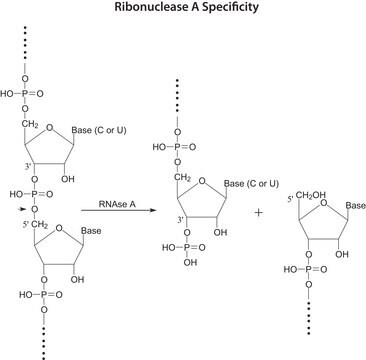HTS071M
ChemiSCREEN Membrane Preparation Recombinant Human ChemR23 Chemoattractant Receptor
Human ChemR23 / CMKLR1 GPCR membrane preparation for Radioligand binding Assays & GTPγS binding.
Se connecterpour consulter vos tarifs contractuels et ceux de votre entreprise/organisme
About This Item
Code UNSPSC :
41106514
eCl@ss :
32161000
Nomenclature NACRES :
NA.84
Produits recommandés
Source biologique
human
Niveau de qualité
Produit recombinant
expressed in Chem-1 cells
Fabricant/nom de marque
ChemiScreen
Chemicon®
Technique(s)
ligand binding assay: suitable (GTPγS)
radioligand binding assay (RLBA): suitable
Numéro d'accès NCBI
Numéro d'accès UniProt
Conditions d'expédition
dry ice
Description générale
ChemR23 was discovered as an orphan receptor related to the chemoattractant receptors C3a, C5a and FPR1, and expressed on dendritic cells and macrophages (Samson et al., 1998). A ligand for ChemR23 was characterized as chemerin, a 15 kD proteolytically processed protein found in inflammatory sites; a 9 amino acid peptide from the C-terminus of chemerin is sufficient to activate ChemR23 (Wittamer et al., 2003, 2004). Chemerin expressed in lymphoid and microvascular endothelium mediates migration of ChemR23-expressing dendritic cells to lymphoid organs and vasculature at sites of inflammation (Vermi et al., 2005). In addition, a bioactive lipid, resolvin E1, was found to functionally interact with ChemR23 to reduce inflammation (Arita et al., 2005). Millipore′s ChemR23 membrane preparations are crude membrane preparations made from our proprietary stable recombinant cell lines to ensure high-level of GPCR surface expression; thus, they are ideal HTS tools for screening of ChemR23 interactions with its ligands. The membrane preparations exhibit EC50s of 0.37 nM for chemerin in a GTPγS binding assay.
Full-length human ChemR23
Application
Radioligand binding assay and GTPγS binding.
Actions biochimiques/physiologiques
GPCR Class: A
Protein Target: ChemR23 / CMKLR1
Target Sub-Family: Chemoattractant
Qualité
SPECIFICATIONS: 1 unit = 5 μg
EC50 in GTPγS binding assay by Chemerin: ~ 0.37 nM
EC50 in GTPγS binding assay by Chemerin: ~ 0.37 nM
Caractéristiques
Inucbation Conditions
ASSAY CONDITIONS: Membranes are permeabilized by addition of saponin to an equal concentration by mass, then mixed with [35S]-GTPγS (final concentration of 0.3 nM) in 20 mM HEPES, pH 7.4/100 mM NaCl/10 mM MgCl2/0.5 μM GDP in a nonbinding 96-well plate. Unlabeled chemerin was added to the final concentration indicated in Figure 1 (final volume 100 μL), and incubated for 30 min at 30°C. The binding reaction is transferred to a GF/B filter plate (Millipore MAHF B1H) previously prewetted with water. The plate is washed 3 times (1 mL per well per wash) with cold 10 mM sodium phosphate, pH 7.4, then dried and counted.
One vial contains enough membranes for at least 200 assays (units), where one unit is the amount of membrane that will yield greater than 1000 cpm specific chemerin-stimulated [35S]-GTPγS binding.
The ChemR23 membrane preparation is expected to be functional in a radioligand binding assay; however, the end user will need to determine the optimal radiolabeled ligand for use with this product.
ASSAY CONDITIONS: Membranes are permeabilized by addition of saponin to an equal concentration by mass, then mixed with [35S]-GTPγS (final concentration of 0.3 nM) in 20 mM HEPES, pH 7.4/100 mM NaCl/10 mM MgCl2/0.5 μM GDP in a nonbinding 96-well plate. Unlabeled chemerin was added to the final concentration indicated in Figure 1 (final volume 100 μL), and incubated for 30 min at 30°C. The binding reaction is transferred to a GF/B filter plate (Millipore MAHF B1H) previously prewetted with water. The plate is washed 3 times (1 mL per well per wash) with cold 10 mM sodium phosphate, pH 7.4, then dried and counted.
One vial contains enough membranes for at least 200 assays (units), where one unit is the amount of membrane that will yield greater than 1000 cpm specific chemerin-stimulated [35S]-GTPγS binding.
The ChemR23 membrane preparation is expected to be functional in a radioligand binding assay; however, the end user will need to determine the optimal radiolabeled ligand for use with this product.
Forme physique
Liquid in packaging buffer: 50 mM Tris pH 7.4, 10% glycerol and 1% BSA no preservatives.
Packaging method: Membranes protein were adjusted to 1 mg/ml in 1 ml packaging buffer, rapidly frozen, and stored at -80°C
Packaging method: Membranes protein were adjusted to 1 mg/ml in 1 ml packaging buffer, rapidly frozen, and stored at -80°C
Stockage et stabilité
Maintain frozen at -70°C for up to 2 years. Do not freeze and thaw.
Informations légales
CHEMICON is a registered trademark of Merck KGaA, Darmstadt, Germany
Clause de non-responsabilité
Unless otherwise stated in our catalog or other company documentation accompanying the product(s), our products are intended for research use only and are not to be used for any other purpose, which includes but is not limited to, unauthorized commercial uses, in vitro diagnostic uses, ex vivo or in vivo therapeutic uses or any type of consumption or application to humans or animals.
Code de la classe de stockage
12 - Non Combustible Liquids
Classe de danger pour l'eau (WGK)
WGK 2
Certificats d'analyse (COA)
Recherchez un Certificats d'analyse (COA) en saisissant le numéro de lot du produit. Les numéros de lot figurent sur l'étiquette du produit après les mots "Lot" ou "Batch".
Déjà en possession de ce produit ?
Retrouvez la documentation relative aux produits que vous avez récemment achetés dans la Bibliothèque de documents.
Notre équipe de scientifiques dispose d'une expérience dans tous les secteurs de la recherche, notamment en sciences de la vie, science des matériaux, synthèse chimique, chromatographie, analyse et dans de nombreux autres domaines..
Contacter notre Service technique






